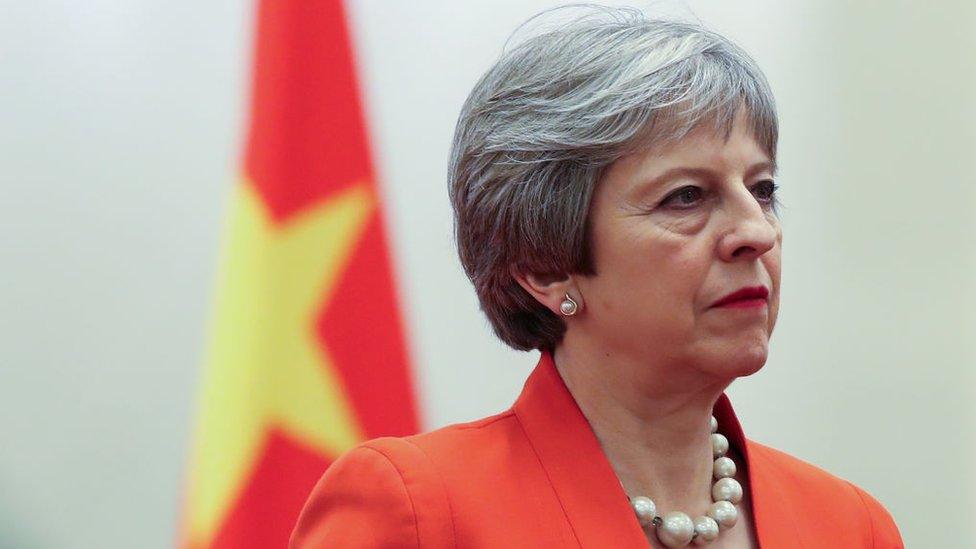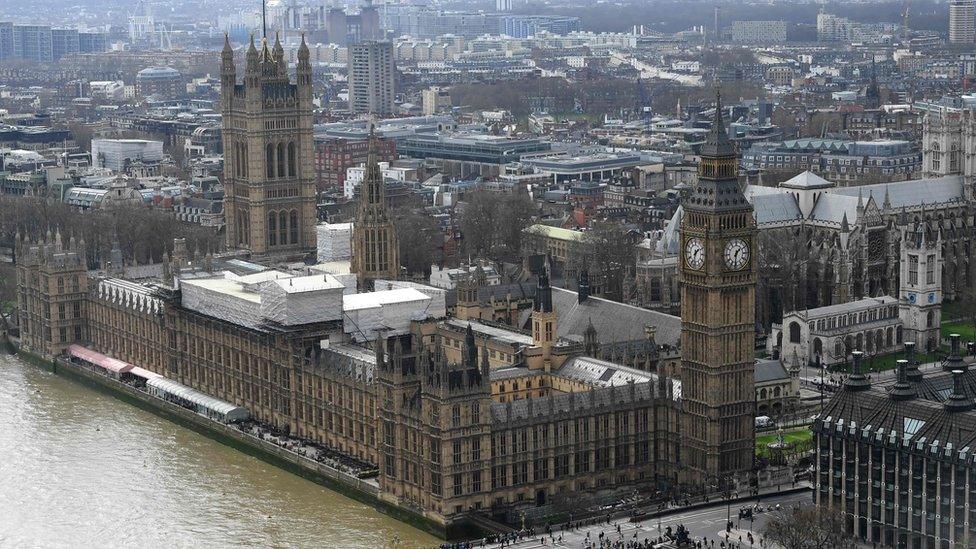Are the Conservatives now unleadable on Brexit?
- Published

The pressure on Theresa May - to somehow get her finger out, to do her job and lead, and more specifically to point the direction and even destination of Brexit - keeps rising.
Talk privately to Conservative MPs and it quickly becomes apparent the needle on the political pressure gauge has begun to edge into the red zone denoting danger.
Speaking on BBC Radio 4's Today programme, George Osborne reminded us - and Mrs May, if she needed reminding - the threat to her position does not come exclusively from the increasingly vocal ranks of Tory Brexiteers.
True, the former chancellor is, well, a former chancellor. His antipathy to the Brexit project has been well advertised in the London Evening Standard newspaper which he edits.
His hostility to Mrs May is also scarcely a secret since he's known to have privately aired a grisly wish to see the prime minister chopped into pieces and placed in his freezer. One assumes he was speaking figuratively.
But it's also true that Mr Osborne is still extraordinarily well connected with his former colleagues, and frequently prints what Tory sceptics and opponents of Brexit are saying privately.
In this case, it was to point out that the balance of opinion in both Houses of Parliament is broadly sympathetic to the Chancellor Philip Hammond's desire to keep Britain's future relationship with the EU as close to the terms of the customs union and European single market as possible.
Local election fears
Also that like-minded MPs and peers in all parties have the voting strength to block a sharp break in the relationship after Brexit, if they choose to defy the wrath of Brexiteer colleagues and voters and use those votes.
What's more immediately worrying for Theresa May is that while former "Remainers" among Tory MPs like to point out the Brexiteers make more noise, and more often bare their teeth at her, those Remainers too can now be heard saying the lack of direction on Brexit is becoming unsustainable
Ministerial assurances that Britain will somehow achieve its ambition of a seamless transition to "frictionless" trade with the EU after Brexit (despite the repeated warnings from EU leaders that this is not possible) are no longer cutting it.
Conservative MPs in the Remain stronghold of London are muttering about the danger of the Tories taking a retributive pasting in May's local elections, and the inevitable backlash among sitting MPs, candidates and defeated councillors.
Meanwhile, Mrs May and her team have, understandably, stepped up their efforts to keep their fingers on the pulse of their Brexiteer colleagues. This week the Brexiteers met the government chief whip at number nine Downing Street.
Worries were expressed about the Brexit transition. I'm told there were demands, more in hope than expectation, for the scalp of the UK's lead civil service negotiator Olly Robbins, who is seen by Brexiteers as a likely source of unwanted compromise.
Nagging questions
These clear-the-air meetings are to be convened more frequently in future.
The prime minister's words on the status of EU migrants in Britain during a Brexit transition were a reassertion of the government's wish to form an immigration policy which has yet to take shape in any significant detail.
Her words were plainly delivered with a nervous glance in the direction of potentially militant Brexiteers. Given their potential to rock the Tory boat, and even help tip the prime minister over the side, this seems political common sense.
But it won't restore calm, or answer nagging questions on all sides.
Even allowing for the fact that the end destination of Brexit can only emerge in the give-and-take of negotiations which have barely begun, the desired outcome for Mrs May is still largely a mystery.
Any detailed and decisive shift in policy away from, or close to, the status quo could easily provoke a fatal confrontation with either Brexiteers or Remainers, and conceivably with both.

The Conservatives lost their Commons majority at the general election
Most Tory MPs still hope and pray that calm can, somehow, be restored. "Trouble-makers" are criticised for speaking out and "making things worse".
Brexiteers tend to point the finger of blame at the Remainers, who do the opposite. The mood at last night's private meeting of backbench MPs, the 1922 Committee, was a plaintive collective appeal to "keep calm and carry on".
But with no majority in the Commons, the government is vulnerable on any issue, and Brexit above all. The power of rival factions is magnified. The danger to Mrs May should Brexit unravel, or the party suffer some unforeseen crisis, is real. The pressure for May to "give a lead" is easy to understand and will likely increase.
The painful reality confronting the prime minister as she contemplates those demands, and considers how to respond to them and keep hold of her job, is that on the issue of Brexit her party may have become unleadable.